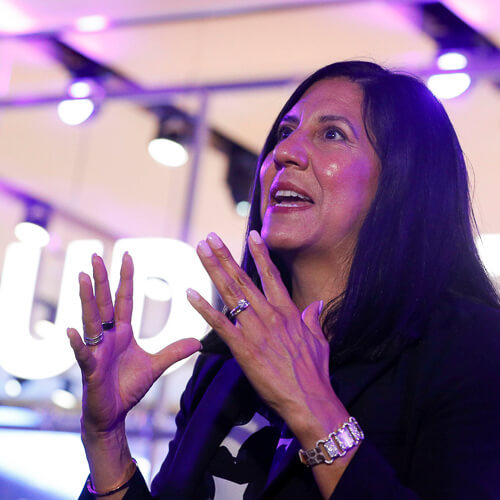After Totogi, Royston wants to cloudify the entire telco stack
Danielle Royston still has a $1 billion fund at her disposal and is biding her time as the technology sector contracts.

When she is not buying software companies like Totogi or proselytizing about the public cloud, Danielle Royston is often found smacking fluffy yellow balls over a three-foot net.
On the International Tennis Federation circuit, she achieved a career-high ranking of 20 in her age group the year before the pandemic. And like any half-decent player, Royston would know success is frequently about picking the right moment to strike.
It is partly why she has not followed up her $100 million takeover of Totogi, a developer of business support systems (BSS) for telecom operators, with similar moves.
Figure 1:  Danielle Royston says the entire telco stack needs rewriting for the cloud.
Danielle Royston says the entire telco stack needs rewriting for the cloud.
(Source: Reuters/Alamy Stock Photo)
"With the tech contraction that we see and the valuations dropping, I'm OK with being patient," she told Light Reading during a meeting at The Ned, a swanky hotel opposite London's Bank tube station.
"It is really important to me that we pay back on the investment and there is a strong business case. We have come close on a couple of things, and we've some things to people that wanted to pay more."
Royston claims to have about $1 billion at her disposal after setting up what she calls a "telco transformation fund" last October. Branded Skyvera, it is built largely on a takeover of ZephyrTel, formerly owned by ESW Capital.
Rumors abound that ESW Capital and its billionaire founder Joseph Liemandt are the sources of Royston's funding pool. She was previously the CEO of Optiva, a telco software company that received investment from ESW Capital, and is thought to be close to Liemandt. Royston, though, has remained coy on the subject.
Thanks to acquisitions it made as ZephyTel under ESW Capital, Skyvera can already list a small portfolio of companies on its website. Including startups like Accuris and Vasona, they cover various parts of the telco software stack and Royston says her own takeover strategy is not limiting.
"It is not necessarily a product-led strategy," she said.
"I think the entire telco stack needs rewriting for the public cloud. There is a ton of companies that followed the way telco was doing it in the nineties – on premises and client servers – and they don't have the energy of the funding to do it in the cloud. Let's talk to all the software companies out there and see who's for sale."
AWS fidelity
Tech valuations have certainly dropped since the start of the year. Shares in Apple, the world's biggest technology company by market cap, are down 18%, while Amazon, the owner of the largest public cloud, has lost nearly a third of its equivalent value.
Those movements are usually a good barometer of sentiment about much smaller companies in the same industry. If they have whetted Royston's appetite, prospective dealmakers may worry about selling at the bottom of a curve.
Her long-term, overarching plan is still hard to figure out. Royston has described herself as a cheerleader or evangelist for the public cloud, fulminating about the drawbacks of running back-office software on your own premises.
With Totogi, which specializes in charging products, up to 1 billion subscribers can be managed from a single "instance" of its software in the public cloud.
Figure 2: Share price movements of Big Tech this year  (Source: Google Finance)
(Source: Google Finance)
"Typically, the way legacy chargers scale is by installing a copy of the stack with more hardware," she said.
"There is a limit to how much on premises I can use."
Instead of adding hardware and IT resources (and cost) as the business scales, an operator can plump for a subscription-based Totogi service and be dramatically better off – or such is the Totogi pitch. Royston's job as acting CEO involves persuading telcos of these benefits and telling them it is time to stop worrying and love the public cloud.
In Totogi's case, that means running on AWS, not Google Cloud, Microsoft Azure or various lesser clouds. This fidelity gives Totogi full and unfettered access to AWS features – something it would lack were it less faithful to one public cloud, according to Royston.
"This is a big debate but when you design for cloud agnosticism it narrows the elements you can put into your product," she said.
"We picked DynamoDB – it is not a relational database and is an Amazon-only proprietary technology and no, I can't easily move. That was a design decision."
Want to know more about 5G? Check out our dedicated 5G content channel here on Light Reading.
That is unlikely to ease telco anxiety about cloud "lock-in," with many operators worried they are too reliant on a handful of big suppliers.
Royston, however, has repeatedly argued that the benefits of these deals outweigh the risks, and AWS continues to be the engine of Amazon's growth, its revenues soaring 37% year-on-year in the recent first quarter, to more than $18.4 billion (overall Amazon sales rose just 7%).
Totogi, meanwhile, can now boast commercial arrangements with Tier-2 operators, according to Royston, as well as some "little projects" with Tier-1s.
Its arrangement with AWS and Royston's apparent desire to cloudify the entire BSS stack may hint at the ultimate Skyvera goals.
ZephyrTel, interestingly, signed a strategic collaboration agreement with AWS back in 2019, a year after its formation, with the aim of migrating various platforms and portfolio companies to the AWS cloud. An AWS-enabled Skyvera stack would be an intriguing proposition.
Related posts:
— Iain Morris, International Editor, Light Reading
Read more about:
EuropeAbout the Author(s)
You May Also Like




_International_Software_Products.jpeg?width=300&auto=webp&quality=80&disable=upscale)







